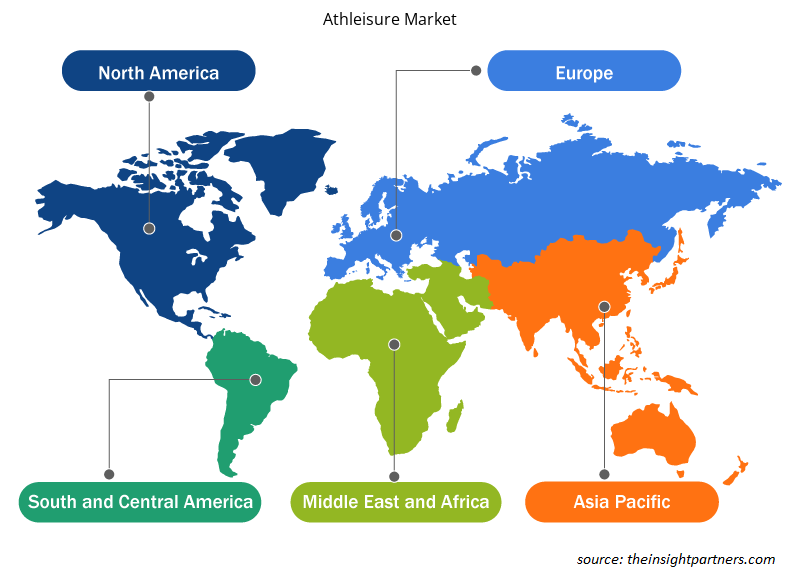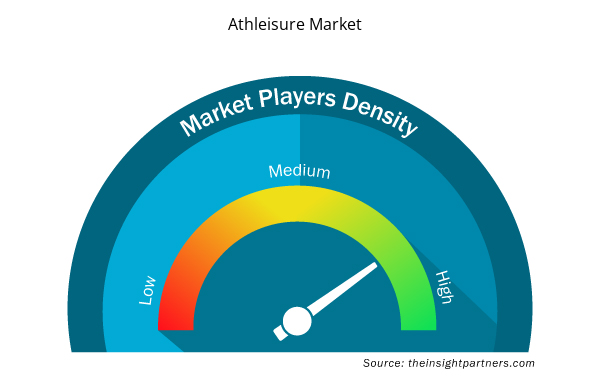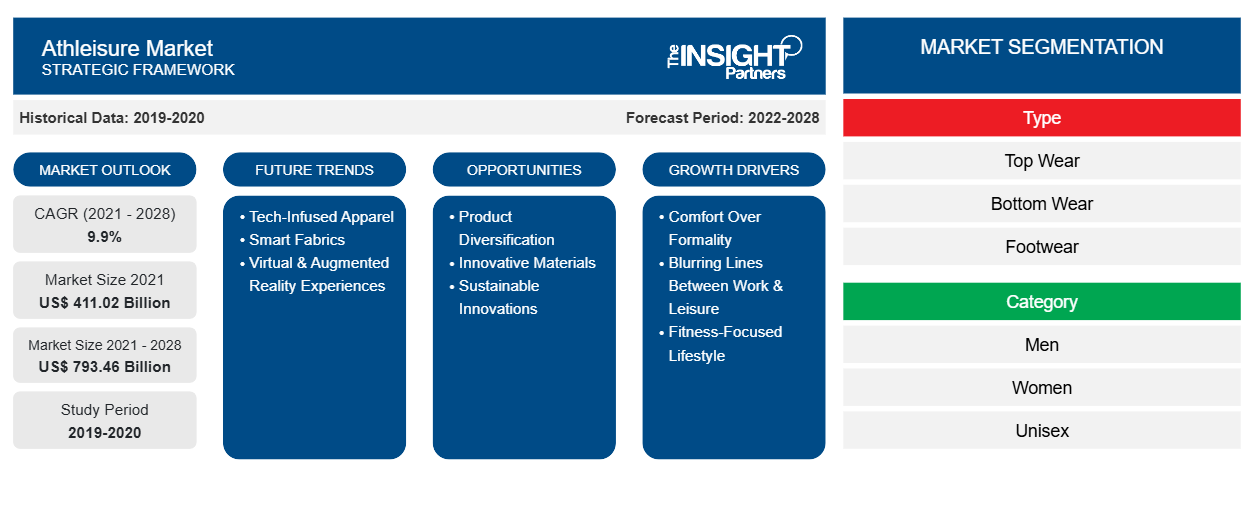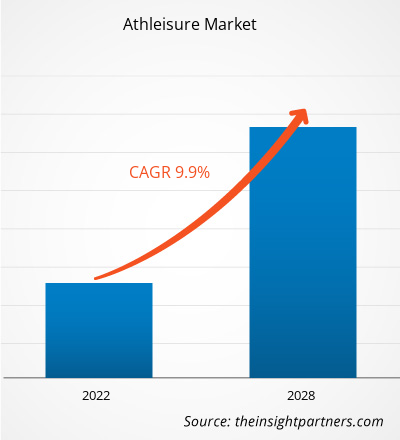Si prevede che il mercato dell'athleisure crescerà da 411,02 miliardi di dollari nel 2021 a 793,46 miliardi di dollari entro il 2028; si stima che crescerà a un CAGR del 9,9% dal 2021 al 2028.
Athleisure si riferisce alla tendenza della moda caratterizzata da abbigliamento sportivo comodo ed esteticamente accattivante. È realizzato con materiali che sono tradizionalmente specifici per l'abbigliamento sportivo e da palestra, ma è disegnato per essere appropriato per l'abbigliamento casual di tutti i giorni.
Nel 2020, il Nord America ha dominato il mercato globale e si prevede che manterrà il suo predominio durante il periodo di previsione. La crescente consapevolezza sull'adozione di stili di vita sani ha incoraggiato i clienti in Nord America a dedicarsi ad attività di fitness/sportive, il che sta guidando la domanda di athleisure nella regione. Inoltre, la crescente presenza di marchi internazionali e nazionali e l'aumento del reddito disponibile delle persone, insieme al desiderio di adottare stili di vita migliori, stanno rafforzando la domanda di athleisure nella regione. L'accettazione dell'athleisure da indossare in vari contesti sociali è aumentata notevolmente negli ultimi anni. Le ricerche di moda per abbigliamento yoga sono cresciute nel 2020 negli Stati Uniti e i clienti stanno optando per più colori nei loro prodotti yoga. Inoltre, l'Asia Pacifica ha detenuto la seconda quota più grande del mercato globale, il che può essere attribuito alla crescente popolarità di attrezzature sportive alla moda, tra cui abbigliamento sportivo e calzature sportive, tra i millennial nella regione.
Personalizza questo report in base alle tue esigenze
Riceverai la personalizzazione gratuita di qualsiasi report, comprese parti di questo report, o analisi a livello nazionale, pacchetto dati Excel, oltre a usufruire di grandi offerte e sconti per start-up e università
- Scopri le principali tendenze di mercato in questo rapporto.Questo campione GRATUITO includerà analisi di dati che spaziano dalle tendenze di mercato alle stime e alle previsioni.
Market Insights
L'aumento della consapevolezza dei consumatori riguardo alla salute e al fitness stimola la crescita del mercato
Negli ultimi anni, c'è stata una maggiore consapevolezza riguardo alla salute e al fitness tra i consumatori in tutto il mondo. Secondo un sondaggio di McKinsey and Company, che ha coinvolto sei paesi: Brasile, Cina, Germania, Regno Unito, Stati Uniti e Giappone, il 79% degli intervistati ha affermato che il benessere è importante e il 42% lo considera una priorità assoluta. Ciò indica che i consumatori di diversi paesi stanno dando priorità alla loro salute e al fitness, il che ha portato a una maggiore partecipazione a yoga, palestre e attività sportive. La domanda di abbigliamento e calzature adeguati e alla moda tra questi consumatori attenti alla salute è in aumento, guidando così la crescita del mercato.
Tipo Informazioni
In base al tipo, il mercato è segmentato in top wear, bottom wear, calzature e altri. Si prevede che il segmento delle calzature sarà il segmento in più rapida crescita nel mercato dell'athleisure . Le calzature sono diventate parte integrante delle attività sportive e di fitness delle persone. I consumatori richiedono sempre più calzature con stili e design diversi che possono essere utilizzate per palestre e attività di fitness, nonché per eventi all'aperto.
Adidas AG; Asics; Athleta LLC; Authentic Brands Group; Columbia Sportswear Company; Hennes and Mauritz AB; Lululemon Athletica; Nike, Inc.; Puma SE; e Under Armour Inc. sono tra i principali attori che operano nel mercato. I principali attori adottano diverse strategie, come fusioni e acquisizioni, e lanci di prodotti per espandere la loro presenza geografica e la base di consumatori.
Approfondimenti regionali sul mercato dell'athleisure
Le tendenze regionali e i fattori che influenzano il mercato dell'Athleisure durante il periodo di previsione sono stati ampiamente spiegati dagli analisti di Insight Partners. Questa sezione discute anche i segmenti e la geografia del mercato dell'Athleisure in Nord America, Europa, Asia Pacifico, Medio Oriente e Africa e Sud e Centro America.

- Ottieni i dati specifici regionali per il mercato dell'athleisure
Ambito del rapporto di mercato Athleisure
| Attributo del report | Dettagli |
|---|---|
| Dimensioni del mercato nel 2021 | 411,02 miliardi di dollari USA |
| Dimensioni del mercato entro il 2028 | 793,46 miliardi di dollari USA |
| CAGR globale (2021 - 2028) | 9,9% |
| Dati storici | 2019-2020 |
| Periodo di previsione | 2022-2028 |
| Segmenti coperti | Per tipo
|
| Regioni e Paesi coperti | America del Nord
|
| Leader di mercato e profili aziendali chiave |
|
Densità degli attori del mercato dell'athleisure: comprendere il suo impatto sulle dinamiche aziendali
Il mercato dell'Athleisure Market sta crescendo rapidamente, spinto dalla crescente domanda degli utenti finali dovuta a fattori quali l'evoluzione delle preferenze dei consumatori, i progressi tecnologici e una maggiore consapevolezza dei benefici del prodotto. Con l'aumento della domanda, le aziende stanno ampliando le loro offerte, innovando per soddisfare le esigenze dei consumatori e capitalizzando sulle tendenze emergenti, il che alimenta ulteriormente la crescita del mercato.
La densità degli operatori di mercato si riferisce alla distribuzione di aziende o società che operano in un particolare mercato o settore. Indica quanti concorrenti (operatori di mercato) sono presenti in un dato spazio di mercato in relazione alle sue dimensioni o al valore di mercato totale.
Le principali aziende che operano nel mercato dell'athleisure sono:
- Adidas AG
- Azienda di abbigliamento sportivo Columbia
- Società per azioni Gap Inc.
- Hennes & Mauritz AB
- Società ASICS
Disclaimer : le aziende elencate sopra non sono classificate secondo un ordine particolare.

- Ottieni una panoramica dei principali attori del mercato Athleisure
Segnala i riflettori
- Tendenze progressive nel settore dell'athleisure per aiutare i giocatori a sviluppare strategie efficaci a lungo termine
- Strategie di crescita aziendale adottate dalle aziende per garantire la crescita nei mercati sviluppati e in via di sviluppo
- Analisi quantitativa del mercato dell'athleisure dal 2019 al 2028
- Analisi PEST per illustrare l'efficacia degli acquirenti e dei fornitori che operano nel settore dell'athleisure
- Sviluppi recenti per comprendere lo scenario competitivo del mercato e la domanda di athleisure
- Tendenze e prospettive di mercato, insieme ai fattori che regolano la crescita del mercato dell'athleisure
- Comprensione delle strategie che sostengono l'interesse commerciale sulla crescita del mercato dell'athleisure, aiutando nel processo decisionale
- Dimensioni del mercato dell'athleisure in vari nodi del mercato
- Panoramica dettagliata e segmentazione del mercato dell'athleisure e delle sue dinamiche di settore
- Dimensioni del mercato dell'athleisure in varie regioni con promettenti opportunità di crescita
"Global Athleisure Market Analysis to 2028" è uno studio specializzato e approfondito del settore dei beni di consumo, incentrato sull'analisi delle tendenze del mercato athleisure. Il rapporto mira a fornire una panoramica del mercato con una segmentazione dettagliata del mercato. Il mercato athleisure è segmentato in base a tipo, categoria, canale di distribuzione e geografia. In base al tipo, il mercato è segmentato in top wear, bottom wear, calzature e altri. In base alla categoria, il mercato athleisure è segmentato in uomo, donna, unisex e bambino. In base al canale di distribuzione, il mercato è segmentato in supermercati e ipermercati, negozi specializzati, vendita al dettaglio online e altri. In base alla geografia, il mercato è segmentato in cinque regioni principali: Nord America, Europa Asia Pacifico (APAC), Sud e Centro America (SCAM) e Medio Oriente e Africa (MEA). Si prevede che l'Asia-Pacifico sarà il segmento in più rapida crescita nel mercato athleisure, seguito dal Nord America.
Profili aziendali
- Adidas AG
- ASIC
- Athleta LLC
- Gruppo marchi autentici
- Azienda di abbigliamento sportivo Columbia
- Hennes e Mauritz AB
- Atletica Lululemon
- Nike, Inc.
- Puma Italia
- Sotto Armour Inc.
- Analisi storica (2 anni), anno base, previsione (7 anni) con CAGR
- Analisi PEST e SWOT
- Valore/volume delle dimensioni del mercato - Globale, regionale, nazionale
- Industria e panorama competitivo
- Set di dati Excel



Report Coverage
Revenue forecast, Company Analysis, Industry landscape, Growth factors, and Trends

Segment Covered
This text is related
to segments covered.

Regional Scope
North America, Europe, Asia Pacific, Middle East & Africa, South & Central America

Country Scope
This text is related
to country scope.
Domande frequenti
Rising health and self-consciousness, as well as a desire to live an active lifestyle and look fit, are motivating consumers to include sports and fitness activities into their daily routine. This increasing engagement has resulted in a shift in market dynamics, which has resulted in a rise in demand for athleisure products. As exercise becomes increasingly important, those between the ages of 16 and 30 are the most active athleisure users. These factors are driving the athleisure market.
During the forecast period, the footwear segment is expected to be the fastest-growing segment. Footwear demand has been boosted by an increase in the number of specialized and franchised footwear stores, as well as collaborations between footwear companies and other retail chains. Footwear segment will be influenced by product development advancements made by market participants.
Based on category, women is the fastest-growing segment. Women's increased engagement in sports and fitness is expected to fuel the market development. A growing number of women joining sports clubs is also predicted to fuel the market growth. Celebrity endorsements, marketing, and activities organized by well-known individuals have a significant influence on customers.
In 2020, the bottomwear segment accounted for the largest market share. Bottomwear products demand is being driven by rising internet penetration, changing lifestyles, and fashion trends. The growing popularity of bottomwear products in emerging markets provides a tremendous opportunity for manufacturers to focus on dynamic design and appearance.
The major players operating in the athleisure market are Adidas AG, Columbia Sportswear Company, Gap Inc., Hennes & Mauritz AB, ASICS Corporation, Lululemon Athletica Inc., Nike, Inc., Puma SE, Under Armour, Inc., and Authentic Brands Group LLC.
In 2020, North America accounted for the largest share of the global athleisure market. The athleisure industry is anticipated to expand faster due to increasing awareness of health and fitness. The growing number of gymnasiums, fitness clubs, and yoga centers, as well as the growth of the retail stores that sell customized hoodies, joggers, shoes, and etc., contributes to the market growth in the region.
Trends and growth analysis reports related to Consumer Goods : READ MORE..
The List of Companies - Athleisure Market
- Adidas AG
- Columbia Sportswear Company
- Gap Inc.
- Hennes & Mauritz AB
- ASICS Corporation
- Lululemon Athletica Inc.
- Nike, Inc.
- Puma SE
- Under Armour, Inc.
- Authentic Brands Group LLC
The Insight Partners performs research in 4 major stages: Data Collection & Secondary Research, Primary Research, Data Analysis and Data Triangulation & Final Review.
- Data Collection and Secondary Research:
As a market research and consulting firm operating from a decade, we have published and advised several client across the globe. First step for any study will start with an assessment of currently available data and insights from existing reports. Further, historical and current market information is collected from Investor Presentations, Annual Reports, SEC Filings, etc., and other information related to company’s performance and market positioning are gathered from Paid Databases (Factiva, Hoovers, and Reuters) and various other publications available in public domain.
Several associations trade associates, technical forums, institutes, societies and organization are accessed to gain technical as well as market related insights through their publications such as research papers, blogs and press releases related to the studies are referred to get cues about the market. Further, white papers, journals, magazines, and other news articles published in last 3 years are scrutinized and analyzed to understand the current market trends.
- Primary Research:
The primarily interview analysis comprise of data obtained from industry participants interview and answers to survey questions gathered by in-house primary team.
For primary research, interviews are conducted with industry experts/CEOs/Marketing Managers/VPs/Subject Matter Experts from both demand and supply side to get a 360-degree view of the market. The primary team conducts several interviews based on the complexity of the markets to understand the various market trends and dynamics which makes research more credible and precise.
A typical research interview fulfils the following functions:
- Provides first-hand information on the market size, market trends, growth trends, competitive landscape, and outlook
- Validates and strengthens in-house secondary research findings
- Develops the analysis team’s expertise and market understanding
Primary research involves email interactions and telephone interviews for each market, category, segment, and sub-segment across geographies. The participants who typically take part in such a process include, but are not limited to:
- Industry participants: VPs, business development managers, market intelligence managers and national sales managers
- Outside experts: Valuation experts, research analysts and key opinion leaders specializing in the electronics and semiconductor industry.
Below is the breakup of our primary respondents by company, designation, and region:

Once we receive the confirmation from primary research sources or primary respondents, we finalize the base year market estimation and forecast the data as per the macroeconomic and microeconomic factors assessed during data collection.
- Data Analysis:
Once data is validated through both secondary as well as primary respondents, we finalize the market estimations by hypothesis formulation and factor analysis at regional and country level.
- Macro-Economic Factor Analysis:
We analyse macroeconomic indicators such the gross domestic product (GDP), increase in the demand for goods and services across industries, technological advancement, regional economic growth, governmental policies, the influence of COVID-19, PEST analysis, and other aspects. This analysis aids in setting benchmarks for various nations/regions and approximating market splits. Additionally, the general trend of the aforementioned components aid in determining the market's development possibilities.
- Country Level Data:
Various factors that are especially aligned to the country are taken into account to determine the market size for a certain area and country, including the presence of vendors, such as headquarters and offices, the country's GDP, demand patterns, and industry growth. To comprehend the market dynamics for the nation, a number of growth variables, inhibitors, application areas, and current market trends are researched. The aforementioned elements aid in determining the country's overall market's growth potential.
- Company Profile:
The “Table of Contents” is formulated by listing and analyzing more than 25 - 30 companies operating in the market ecosystem across geographies. However, we profile only 10 companies as a standard practice in our syndicate reports. These 10 companies comprise leading, emerging, and regional players. Nonetheless, our analysis is not restricted to the 10 listed companies, we also analyze other companies present in the market to develop a holistic view and understand the prevailing trends. The “Company Profiles” section in the report covers key facts, business description, products & services, financial information, SWOT analysis, and key developments. The financial information presented is extracted from the annual reports and official documents of the publicly listed companies. Upon collecting the information for the sections of respective companies, we verify them via various primary sources and then compile the data in respective company profiles. The company level information helps us in deriving the base number as well as in forecasting the market size.
- Developing Base Number:
Aggregation of sales statistics (2020-2022) and macro-economic factor, and other secondary and primary research insights are utilized to arrive at base number and related market shares for 2022. The data gaps are identified in this step and relevant market data is analyzed, collected from paid primary interviews or databases. On finalizing the base year market size, forecasts are developed on the basis of macro-economic, industry and market growth factors and company level analysis.
- Data Triangulation and Final Review:
The market findings and base year market size calculations are validated from supply as well as demand side. Demand side validations are based on macro-economic factor analysis and benchmarks for respective regions and countries. In case of supply side validations, revenues of major companies are estimated (in case not available) based on industry benchmark, approximate number of employees, product portfolio, and primary interviews revenues are gathered. Further revenue from target product/service segment is assessed to avoid overshooting of market statistics. In case of heavy deviations between supply and demand side values, all thes steps are repeated to achieve synchronization.
We follow an iterative model, wherein we share our research findings with Subject Matter Experts (SME’s) and Key Opinion Leaders (KOLs) until consensus view of the market is not formulated – this model negates any drastic deviation in the opinions of experts. Only validated and universally acceptable research findings are quoted in our reports.
We have important check points that we use to validate our research findings – which we call – data triangulation, where we validate the information, we generate from secondary sources with primary interviews and then we re-validate with our internal data bases and Subject matter experts. This comprehensive model enables us to deliver high quality, reliable data in shortest possible time.


 Ottieni un campione gratuito per questo repot
Ottieni un campione gratuito per questo repot